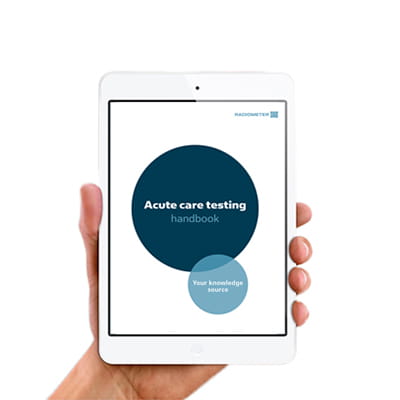Printed from acutecaretesting.org
October 2014
A new role for point-of-care serum BNP testing?
Summarized from Yang H-L, Lin Y-P, Long Y et al. Predicting cardioembolic stroke with the B-type natriuretic peptide test: A systematic review and meta-analysis. J Stroke Cerebrovasc Dis 2014; 23: 1882-89 Wu Z, Yang L, Guo Q et al. Experiences and the use of BNP POCT platform on suspected ischemic stroke patients in the emergency department setting. Clinical Neurology and Neurosurgery 2014; 123: 199-200
Circulating concentrations of the hormone brain natriuretic peptide (BNP) and its precursor molecule, NT-proBNP are increased in those with heart failure. This has allowed a now established role for serum BNP and NT-proBNP testing in the investigation of patients presenting with shortness of breath, a cardinal symptom of heart failure.
The finding of normal levels in such patients excludes a diagnosis of heart failure and prompts the search for an alternative explanation of the breathlessness. Increased serum BNP/NT-proBNP is not specific for heart failure so the test cannot be used alone to make a definitive diagnosis of heart failure, although it is true that the finding of a very high level in a patient complaining of breathlessness is highly suggestive of heart failure.
Among the other conditions that are associated with increased levels is ischemic stroke, and there is research interest in the notion that measurement of BNP/NT-proBNP might have clinical application for victims of stroke.
Much of this research has focused on the ability of both tests to discriminate one form of ischemic stroke, cardioembolic stroke from other types. Rapid diagnosis of cardioembolic stroke is particularly important for optimum management, which includes early anticoagulation therapy to prevent recurrent embolism.
Many studies over the past 5-10 years have demonstrated that BNP/NT-proBNP levels are significantly higher in cardioembolic stroke compared with other forms of stroke, but not all studies have demonstrated that BNP or NT-proBNP can reliably distinguish cardioembolic stroke from other types of stroke. To resolve the apparent inconsistency in these studies Chinese researches performed a systematic review and meta-analysis of all these studies.
This recently published meta-analysis combined the results of 14 studies. In total, BNP or NT-proBNP levels relating to 2958 ischemic stroke victims were analyzed. Of the 2958 study patients, 1024 (36.4 %) had a cardioembolic stroke. For some studies blood was sampled at admission but in others blood was sampled up to 72 hours after admission. Five of the 14 studies evaluated serum BNP, the remaining nine evaluated serum NT-proBNP.
In summary, the analysis allowed the authors to conclude that BNP (and NT-proBNP) have reasonable accuracy in the diagnosis of cardioembolic stroke. This study has provided the best evidence to date that measurement of BNP or NT-proBNP has potential value in the initial work-up and management of stroke victims.
For some, including the authors of a recent letter to the editor section of the journal Clinical Neurology and Neurosurgery, the case in favor of using BNP or NT-proBNP has already been made. They describe the algorithm they use in their emergency department for assessment of patients suspected of suffering stroke; it includes point-of-care measurement of BNP to identify those whose stroke was caused by cardioembolism.
May contain information that is not supported by performance and intended use claims of Radiometer's products. See also Legal info.
Acute care testing handbook
Get the acute care testing handbook
Your practical guide to critical parameters in acute care testing.
Download nowScientific webinars
Check out the list of webinars
Radiometer and acutecaretesting.org present free educational webinars on topics surrounding acute care testing presented by international experts.
Go to webinars







